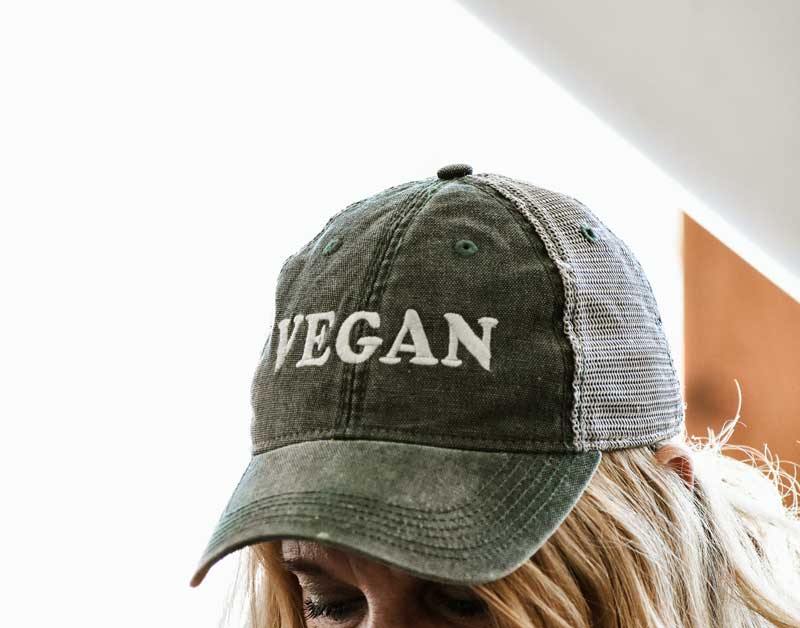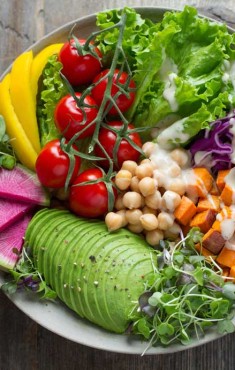If your youth athlete is dedicated to their sport and follows their coaches’ advice, then their success depends on the quality of their training, their overall health, and diet. On top of that, participating in intense sports (like the many high-performance tennis and football academies offered by Ertheo) puts more pressure on youth athletes at a time when their bodies are developing and growing at a rapid pace. This makes it even more important fora young person to put the right kind of food in their bodies, so they can keep up with their demanding lifestyle. But what if your youth athlete decides to pursue a vegetarian or vegan lifestyle? Will this impact their performance? How do you know if this the right choice for them?
Many people cut animal proteins out of their diet for a variety of reasons; to help the environment, for religious reasons, because all their friends are doing it, or because they just want to adopt a healthier lifestyle. When done correctly, many vegans express how much better they feel overall. But youth athletes fall into a different category, because the more you train, the more calories you need to consume to sustain your body. Therefore, there’s a question about whether vegan diets for athletes provide young people with enough vitamins, nutrients, fats, carbohydrates and the proteins they need to boost their energy and excel in their sport.
However, there’s no “one-size-fits-all” diet for anyone, so it’s best to weigh up the pros and cons to determine whether a vegan diet is right for your youth athlete.

Table of Contents
Types of Vegetarians
First of all, what is a vegetarian or a vegan? Again, there’s no all-encompassing diet that works for all youth athletes, that facilitates optimal performance; it’s most important for athletes to maintain a balanced diet by ensuring they eat enough of the right fruits/vegetables, grains, seeds, dairy (or its alternatives), and protein (in the form of meat or animal protein alternatives). There are various reasons why people may take on a more plant-based lifestyle, but there are different levels of vegetarianism just like there are different kinds of carnivores. Here are some of the main types of vegan/vegetarian diets that athletes tend to experiment with:
- Semi-vegetarian: Someone who is semi-vegetarian generally eats certain types of animal proteins like chicken and fish but definitely not beef.
- Lacto-vegetarian: This type of vegetarian does not consume any kind of meat, fish, fowl, or dairy products
- Pescatarian: A pescatarian (the word “pesca” is derived from a word that means “fishing” in Spanish) doesn’t eat any meat except for fish.
- Vegan: A vegan does not consume any type of product derived from an animal, including all meat, fish, fowl, dairy, eggs, cheese, or butter.
There are a few staple foods that are prevalent in all types of vegan diets for athletes, including legumes/beans, grains/bread, and fruits/vegetables. Many athletes modify their diet to fit their needs though, like if they are gluten-free then they will pay special attention to what kind of bread or grains they consume (for instance, it’s easy for athletes to adopt a lacto-vegetarian diet if they are already lactose intolerant). No matter what type of diet they pursue, to stay competitive in sports, youth athletes generally must supplement their diet with vitamins, protein bars, and antioxidant-rich foods to keep their energy and strength up.
The Four Principle advantages of Vegan/Vegetarian Youth Athletes
Generally, people who try out a plant-based diet stick with it when they notice that their body feels better. For instance, pro tennis player Venus Williams became fully vegan after being diagnosed with Sjorgen’s syndrome and enlisted the aid of Chef Laura Von Der Pool to help her keep her caloric intake up so that she had enough fuel to burn off on the tennis courts.
Fortunately, now is a great time to turn vegan- whether you’re a young athlete or not. Here are some reasons why it can be good for young athletes to be vegetarians or vegans:
- The world is adapting and therefore making a vegan diet more affordable for the average consumer: Meat and dairy substitutes have really taken off over the last few years, with the advent of food items like the Impossible Burger, cashew cheese, and people drinking coffees with almond/coconut/soy/oat milk alternatives. With almond milk chai lattes and Chipotle sofritas burrito bowls being the norm now, it’s easier than ever for a youth athlete to maintain their vegan diet when they’re on the go. Even Country Crock recently released a plant butter made with olive oil (though it’s actually its Willow Run margarine brand that’s completely vegan).
- Health benefits: Switching to a plant-based diet can lower the risk of heart disease, certain kinds of cancer, and mitigate the risk of developing Type II diabetes. Because you are not consuming large amounts of the trans fats that are prevalent in meat products, the body’s levels of cholesterol and blood pressure are both lower.
- More fruits and veggies= more antioxidants= stronger immune system: Antioxidants play an important role in helping to reduce the damaging effects of oxidation and free radicals from entering and overtaking the body, and combating against diseases such as rheumatoid arthritis, cataracts, and certain cancers. Popular vegan meals that are heavy in the antioxidants and natural sugars that help a young athlete include blueberry shakes, acai bowls, and pomegranate juice.
- It’s trending: Search #veganlife on Instagram and more than 7 million hits come up, showing everything from delicious-looking grains bowls, desserts, and sweet potato/kale-chocked dishes, to tips on how to combat fatigue on a vegan diet and celebrity endorsements. Recently, the “Veganuary” movement picked up steam in 2020, when more than 350,000 people worldwide pledged to eat animal protein-free foods for the month of January. Hollywood also participated by having an all-vegan menu during its recent annual Golden Globes event.
The Four biggest Cons for Vegan/Vegetarian Youth Athletes
Ever heard this joke? Q: How do you know someone is vegan? A: Don’t worry, they’ll tell you.
This is one of the main drawbacks of being vegan/vegetarian…since the diet can be complicated, it can add an extra layer of confusion, frustration, or ridicule when a vegan informs dinner hosts or restaurant servers of their new way of life, in the hope that they will have something to eat that fits their needs.
The truth is, while being a vegan is getting easier, there is still a lot of stigma around it. Here are some of the main cons of being a vegan/vegetarian athlete:
- A vegan has to go out of his or her way to get the nutrients that they need. Animal proteins contain the nutrients that are lacking in vegan diets; therefore a vegan/vegetarian athlete needs to pay special attention to ensure they are getting the necessary nutrients and vitamins they need to excel in their chosen sport. A vegan must find alternative sources of zinc, vitamin B12, vitamin D, calcium, iron, protein, creatine, and DHA (found in fatty fish) to fill out a balanced diet.
- Rapid weight loss can lead to rapid weight gain. It’s never good to make a drastic change in your life, especially with your diet, because it can easily backfire. Cutting out a big chunk of what you used to eat can lead to rapid weight loss. This can be great at first, but suddenly depriving the body of what it’s used to can make you hungrier, and cause athletes to crave sugary, fatty foods for a quick energy boost that can then lead to a “sugar crash” and eventual weight gain coming back tenfold in the long run.
- It’s hard to bow out of traditions (like eating turkey on Thanksgiving, ham on Christmas, and all the snacks on the Super Bowl). It takes a lot of willpower to stick to a vegan diet 24 hours a day, and turn down delicious meaty foods that are steeped in the family tradition. However, the bright side is that competitive athletes already have a winning mindset, so adapting that attitude towards their diet may help them get through those tough moments.
- It takes more time to read labels. Another joke for you: Q- “How many vegans does it take to change a lightbulb?” A- “Two – one to change the lightbulb and one to read the label on the box.”
Unfortunately, lots of food companies sneak animal oils and fats into their products, therefore a vegan has to be vigilant about spotting them, and then decide whether the product is worth eating or not (like gelatin).
Questions to Ask Before Your Youth Athlete Pursues a Vegan Diet
Becoming vegetarian or vegan is not a decision to be taken lightly, especially if it could affect your youth athlete’s performance. Here are some good questions to ask your child if they are considering adopting a vegan diet:
- Why does your youth athlete want to go vegan?
People become vegan for several reasons, whether it’s for animal rights, concerns about the environment, religious reasons, or health benefits. No matter the motivation, young athletes should be sure to do it for the right reasons, and not just to lose weight.
- Does your youth athlete’s diet include enough of the right kind of protein?
Protein helps strengthen and repair your muscles, so it’s important to have enough of it in your diet. Good sources of protein for a vegan include nuts, tofu, beans, seeds, and protein bars.
- Is your youth athlete getting enough calcium?
Many people believe that the best way to keep youth athlete’s bones strong is by drinking cow’s milk, but calcium and vitamin D can also come in the form of fortified drinks such as rice milk, orange juice, greens (such as kale and bok choy), and almonds.
- Is your athlete getting enough B12?
A young athlete’s nervous system relies on vitamin B12 to maintain its healthy blood cells. Without sufficient vitamin B12, youth athletes can experience fatigue which will affect their performance. Therefore, be sure to get your B12 through meat analogs such as veggie burgers or soy substitutes.
- Is the vegan athlete getting enough iron?
Iron is another supplement that the body needs to prevent fatigue. The best sources of iron are dark greens, beans/lentils, and prunes.
Conclusion- Yes, It’s good for Youth Athletes to Be Vegetarians/Vegans as long as they maintain a balanced diet, experiment in moderation, and do it for the right reasons
There are many professional athletes at the top of their game while maintaining a vegan or vegetarian diet, reaping the benefits of keeping their bodies clean of dangerous free radicals, nitrites, nitrates, growth hormones, or some of the other dangerous chemicals found in meat products. However, people who’ve also cut meat out of their diets have had to make up the lack of animal proteins with vitamins and supplements to maintain the balance they need to succeed in their sport. It all comes down to what Savita Iyer at Self magazine says: “Bottom Line: Make the right choices for you, your beliefs, and your body”.
Additional Tips for Healthy Vegan Eating
- Switch up your meals with a variety of food: Fortunately, more plant-based ingredients and cookbooks become available all the time, which helps create healthy alternatives for meat, without sacrificing flavor and taste. The endless possibilities and innovations coming out in vegan eating have been sparking the interest of youth athletes.
- Keep protein bars around: A competitive athlete that is training regularly, whether they are vegan or not, should be eating at least six meals a day, including snacks. There are many protein bars on the market that fit all types of consumers, from those who are pursuing a keto diet to no-carb Atkins bars and things like Larabars/RXBARs that contain just a few natural ingredients.
- Keep a food routine: Eat regularly and keep quick snacks on hand so your young athlete is consuming and burning calories at the right time.
- Drink lots of water: Along with burning and replenishing all those calories while training, don’t forget to drink water.
Additional resources/VeganCookbooks:
- The No Meat Athlete Cookbook by Matt Frazier and Stepfanie Romine
- CleanEatsby Alejandro Jungar
- The Australian Women’s Weekly Vegan Life
- onegreenplanet.org
Some Examples of Popular Vegan Recipes for Young Athletes
- Probiotic Blueberry Yogurt Bites: https://www.onegreenplanet.org/vegan-food/purple-food-recipes/
References:
- https://www.childrenscolorado.org/conditions-and-advice/sports-articles/sports-nutrition/vegetarian-diet-for-young-athletes/
- https://www.nays.org/sklive/for-parents/understanding-the-needs-of-the-vegetarian-athlete/
- https://www.thesportster.com/entertainment/top-15-athletes-you-didnt-know-were-vegetarian/
- https://well.blogs.nytimes.com/2014/11/24/ask-well-can-athletes-be-vegans/
- https://www.nomeatathlete.com/vegetarian-diet-athletes/
- https://www.childrens.com/health-wellness/what-young-athletes-should-eat-to-perform-their-best
- https://www.active.com/nutrition/articles/the-pros-and-cons-of-a-vegetarian-diet
- https://www.instagram.com/explore/tags/veganlife/
- https://www.onegreenplanet.org/vegan-food/purple-food-recipes/
- https://www.forbes.com/sites/michelinemaynard/2020/01/05/veganuary-and-dry-january-kicking-off-the-year-with-two-dining-movements/#36d65948b510
- https://www.self.com/story/vegan-diet-pros-cons
- https://newslat.com/10-disadvantages-of-vegan-lifestyle/
- https://www.bauerbooks.com.au/Products/59981/veganlife


